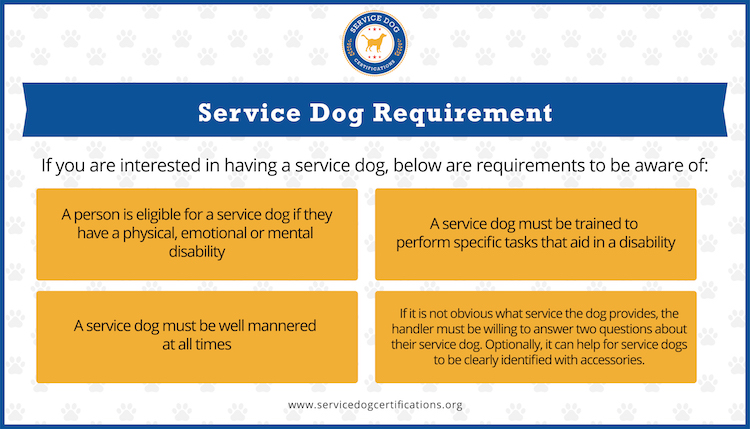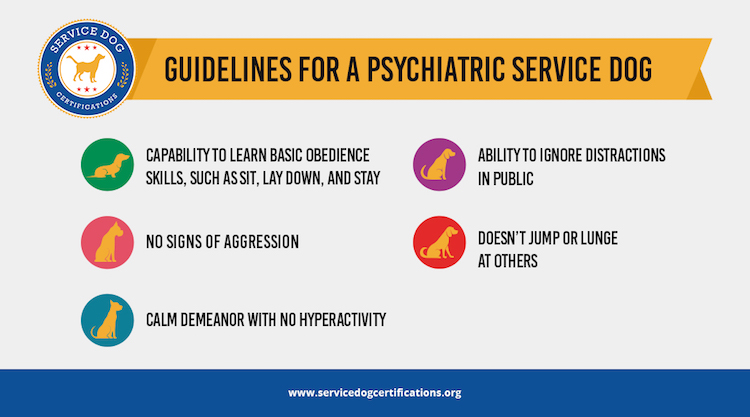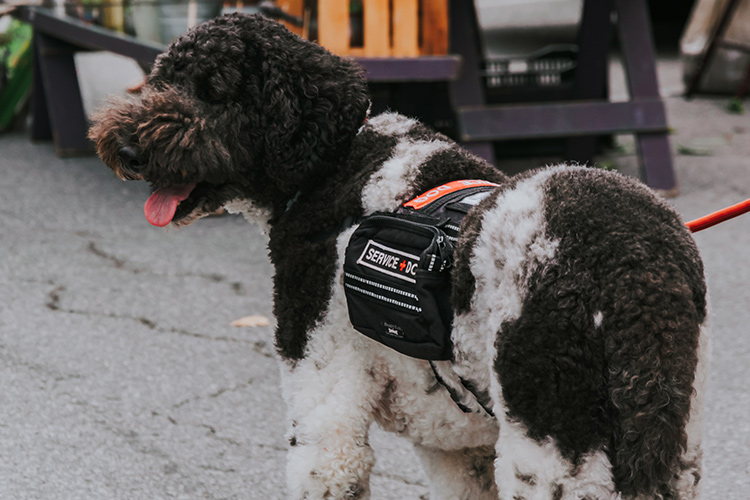Which Disabilities Qualify You for a Service Dog

There’s no doubt that modern treatments have come a long way in improving the quality of life for people with disabilities. Technology also offers new gadgets to help make daily life a little less challenging for disabled individuals. With all these advances, however, nothing compares to the help of a service dog. To understand what a service dog is and what disabilities qualify you for a service dog, read on below.
What is a Service Dog?
Service dogs receive special training to perform particular tasks tailored to the needs of their owner. Unlike pets, the primary reason for the animal’s presence is to accomplish daily tasks for a person with a disability. Because service dogs are so vital to an individual’s well-being and functioning, their presence is protected under the Americans with Disabilities Act (ADA).
Service dogs are not only exceptionally well-trained, but they are also selected for their intelligence and temperament. As federal law allows service dogs to follow their owners into areas not usually allowed by pets, service dogs are trained to behave and be safe in public. For someone with a disability, getting a service dog can be life-changing. Some people with a disability can experience more freedom and independence thanks to their service dogs.

Qualified Disabilities for a Service Dog
If you’re curious about getting a service dog for yourself or someone you love, your first step would be to understand if your disability qualifies you for a service dog.
How is a Disability Defined?
According to the ADA, a disability is defined as:
“Any physiological disorder or condition, cosmetic disfigurement, or anatomical loss affecting one or more of the following body systems: neurological, musculoskeletal, special sense organs, respiratory (including speech organs), cardiovascular, reproductive, digestive, genitourinary, hemic and lymphatic, skin, and endocrine.”
Interestingly, the ADA definition of a disability is both vague and specific at the same time for a reason. It attempts to encompass all the possible disabilities a person may have without creating a broad definition to include everyone. People who have disabilities require specific accommodations. The ADA’s definition of a disability means that a person can be considered disabled for both mental or physical problems.
Having a disability is the first part of being qualified for a service dog. The second is whether a service dog can meet the needs of a disability.

Service Dogs and Disabilities
Not every disability qualifies a person for a service dog. A physician can assess a person’s needs and make an individual assessment as to whether a service dog is beneficial in their situation. Here are a few examples of disabilities that may qualify:
Arthritis
Service dogs can help people with mobility issues by obtaining daily items that they would not get for themselves. For example, these dogs can hand over objects on the floor or help owners slip on their shoes.
Autism
Service dogs can help children with autism remain safe, provide guidance, and encourage tactile stimulations. These dogs also monitor boundaries for a child and can alert others of a child is harming themselves.
Blindness
Service dogs can guide visually impaired individuals through streets and crowded areas, navigating them through situations that would otherwise be dangerous. These dogs can also alert their owners to safety issues and remove fall hazards from their path.
Diabetes
Service dogs can detect low blood sugar in people with diabetes and inform their owners to take precautions. These dogs can also call 911 in emergencies and obtain life-saving medication during hypoglycemic events.
Seizure/Epilepsy
Service dogs can help to prevent or assist in situations where seizures occur. These dogs can alert owners of impending seizures and place pressure on body parts for safety when seizures happen.
Psychiatric Disorders
Psychiatric service dogs can help obtain medication for people with psychiatric disorders, discourage self-injurious behavior, and deter their owners from situations that may trigger a crisis response.

Other Disabilities That Can Benefit From Service Dogs
- Asthma
- Cerebral Palsy
- Chronic back/neck problems
- Chronic Fatigue
- Fibromyalgia
- Hearing Impairments
- Heart Problems
- Multiple Sclerosis
- Narcolepsy
- Paralysis
- Stroke
If you don’t see your disorder on this list, talk to your licensed therapist if a service dog may benefit you. There are many other disabilities that can qualify for a service dog, depending on the individual’s needs.

Do You Qualify for a Service Dog?
Because service dogs perform such an essential duty, they can follow their owners into all public areas. This allows them to perform their tasks whenever their owners need them. A service dog must be well-behaved and safe with the public at all times. These responsibilities are why service dogs go through such a rigorous selection and training process. To qualify for one of these special dogs depends on your disability, individual status, and physician. Evaluate your daily needs and start a conversation with your practitioner about how a service dog can improve your quality of life.
About the Author: The writing team at Service Dog Certifications is made up of folks who really know their stuff when it comes to disability laws and assistance animals. Many of our writers and editors have service dogs themselves and share insights from their own experiences. All of us have a passion for disability rights and animals.
1 comment
Leave a Reply Cancel reply
Latest Posts

Can you bring a service dog to a museum?
Yes, you can bring your service dog to the museum! All the major U.S. museums welcome guests with service animals in accordance with the Americans with Disabilities Act (ADA). There are some areas, however, that might be off-limits. Here’s what you should know if you plan to spend a day at the museum with your […]

Read More

How to Bring a Service Dog to Six Flags Magic Mountain
Service dogs are welcome at Six Flags Magic Mountain so long as they are, according to Six Flags, “trained to do work or perform tasks for people with disabilities.” Of course, your dog must be housebroken and remain on a leash or harness and under your control while at the park — and the park […]

Read More

When Stores Can Refuse Your Service Dog
According to the Americans with Disabilities Act (ADA), service dogs should be allowed into any store most of the time. A store owner can legally exclude a service dog if they are actively growling, snapping at, or frightening customers, or if the dog is obviously out of the control of its owner. Ordinary behaviors — […]

Read More



Both my husband and I wear aids. My 73 year old spouse got a hearing loss about 5 years ago. Myself have been with Hearing loss since birth. I saw a demonstration at a library of how these dogs are trained – it was amazing. At the time it was for my father who had 95% loss. He lived alone. He refused. The hearing loss runs in our family.
I know we would benefit greatly. Ex. when we take our aids out to go to bed – we can’t hear a thing. Esp if someone is knocking at the door etc.